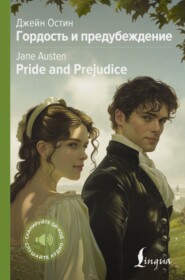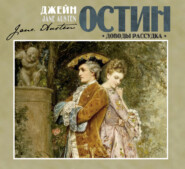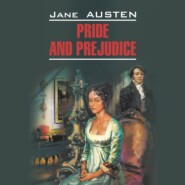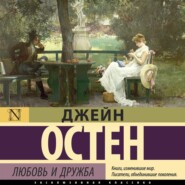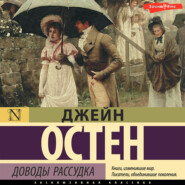По всем вопросам обращайтесь на: info@litportal.ru
(©) 2003-2025.
✖
Эмма / Emma
Настройки чтения
Размер шрифта
Высота строк
Поля
“Is he sure,” said Emma; “that Harriet means to marry him?”
“Well, well, means to make her an offer then. Robert Martin came to the Abbey two evenings ago, on purpose to consult me about it. He came to ask me whether I approved his choice. I was very much pleased with all that he said. He told me everything; his circumstances and plans, and what they all proposed doing in the event of his marriage. He is an excellent young man, both as son and brother. I had no hesitation in advising him to marry.”
“Pray, Mr. Knightley,” said Emma, who had been smiling to herself through a great part of this speech, “he wrote a letter, and was refused.”
Mr. Knightley looked red with surprize and displeasure. He stood up and said,
“Then she is more stupid than I ever believed her. What does the foolish girl think about?”
“Oh!” cried Emma, “it is always incomprehensible to a man that a woman should ever refuse an offer of marriage. A man always imagines a woman to be ready for anybody who asks her.”
“Nonsense! a man does not imagine any such thing. But what is the meaning of this? Harriet Smith refused Robert Martin? Madness, if it is so; but I hope you are mistaken.”
“I saw her answer! – nothing could be clearer.”
“You saw her answer! – you wrote her answer too. Emma, this is your doing. You persuaded her to refuse him.”
“And if I did, I should not feel that I had done wrong. Mr. Martin is a very respectable young man, but I cannot admit him to be Harriet’s equal; and am rather surprized indeed that he should have ventured to address her.”
“Not Harriet’s equal!” exclaimed Mr. Knightley loudly and warmly; and added, a few moments afterwards, “No, he is not her equal indeed, for he is as much her superior in sense as in situation. Emma, your infatuation about that girl blinds you. What are Harriet Smith’s claims, either of birth, nature or education, to any connexion higher than Robert Martin? She is the natural daughter of nobody knows whom, with probably no settled provision at all, and certainly no respectable relations. She has been taught nothing useful, and is too young and too simple to acquire anything herself. At her age she can have no experience, and with her little wit, is not very likely ever to have any that can avail her. She is pretty, and she is good tempered, and that is all. I remember saying to myself, ‘Even Emma, with all her partiality for Harriet, will think this a good match.’”
“I cannot help wondering at your knowing so little of Emma. What! think a farmer, (and with all his sense and all his merit Mr. Martin is nothing more,) a good match for my intimate friend! She would leave Highbury for the sake of marrying a man whom I could never admit as an acquaintance of my own!”
“She could be married to a respectable, intelligent gentleman-farmer!”
“As to the circumstances of her birth, there can scarcely be a doubt that her father is a gentleman. Her allowance is very liberal. That she is a gentleman’s daughter, is indubitable to me; that she associates with gentlemen’s daughters, no one, I apprehend, will deny. She is superior to Mr. Robert Martin.”
“Whoever might be her parents,” said Mr. Knightley, “whoever may have had the charge of her, they do not want to introduce her into what you would call good society. After receiving a very indifferent education[43 - a very indifferent education – весьма посредственное образование] she is left in Mrs. Goddard’s hands. She desired nothing better herself. Till you chose to turn her into a friend, her mind had no distaste for her own company. She was as happy as possible with the Martins in the summer. She had no sense of superiority then. If she has it now, you have given it. You have been no friend to Harriet Smith, Emma.”
“You are a very warm friend to Mr. Martin; but, as I said before, are unjust to Harriet. She is not a clever girl, but she does not deserve to be spoken of so slightingly. And she, at seventeen, just entering into life, does not accept the first offer she receives. Let her have time to look about her.”
“I have always thought it a very foolish intimacy,” said Mr. Knightley, “though I have kept my thoughts to myself; but I now perceive that it will be a very unfortunate one for Harriet. You will puff her up[44 - you will puff her up – вы напичкаете её] with such ideas of her own beauty, and of what she must demand, that, in a little while, nobody will be good enough for her. Let her marry Robert Martin, and she is safe, respectable, and happy for ever.”
“We think very differently on this point, Mr. Knightley. We shall only be making each other more angry. But as to my letting her marry Robert Martin, it is impossible; she has refused him. His appearance is so much against him, and his manner is so bad. I can imagine, that before she had seen anybody superior, she might tolerate him. He was the brother of her friends, and while she was at Abbey-Mill, she found him agreeable. But the case is altered now. She knows now what gentlemen are; and nothing but a gentleman in education and manner has any chance with Harriet.”
“Nonsense, errant nonsense!” cried Mr. Knightley. “Robert Martin’s manners have sense, sincerity, and good-humour to recommend them; and his mind has more true gentility than Harriet Smith could understand.”
Emma made no answer, and tried to look unconcerned, but was really feeling uncomfortable and wanting him very much to be gone. She did not repent what she had done; she had respect for his judgment in general. He was sitting just opposite to her in angry state, and that was very disagreeable. Some minutes passed in this unpleasant silence, with only one attempt on Emma’s side to talk of the weather, but he made no answer. He was thinking. The result of his thoughts appeared at last in these words.
“Robert Martin has no great loss[45 - has no great loss – не много потерял]; but you make no secret of your love of match-making, and as a friend I shall just hint to you that if Elton is the man, I think it will be all labour in vain.”
Emma laughed and disclaimed. He continued,
“Elton is a very good sort of man, and a very respectable vicar of Highbury, but not at all likely to make an imprudent match. He knows the value of a good income as well as anybody. Elton may talk sentimentally, but he will act rationally.”
“I am very much obliged to you,” said Emma. “but at present I only want to keep Harriet to myself.”
“Good morning to you,” said he, rising and walking off abruptly. Emma remained in a state of vexation too.
Harriet’s cheerful look and manner established hers: she came back, not to think of Mr. Martin, but to talk of Mr. Elton.
Chapter IX
Mr. Knightley might quarrel with her, but Emma could not quarrel with herself. He was so much displeased, that when they met again, his grave looks showed that she was not forgiven. She was sorry, but could not repent.
The picture, elegantly framed, came safely to hand soon after Mr. Elton’s return, and was hung over the mantelpiece of the common sitting.
“You and Mr. Elton are by situation called together[46 - by situation called together – предназначены друг другу],” said Emma to Harriet; “you belong to one another by every circumstance of your respective homes. Your marrying will be equal to the match at Randalls.”
“That Mr. Elton should really be in love with me, me, of all people! And he, the most handsome man that ever was, and a man that everybody looks up to, quite like Mr. Knightley! And so excellent in the Church! Dear me! When I look back to the first time I saw him! How little did I think!”
“This is an alliance which, whoever – whatever your friends may be, must be agreeable to them, provided at least they have common sense. If they are anxious to see you happily married, here is a man whose amiable character gives every assurance of it.”
“Yes, very true. How nicely you talk; I love to hear you. You understand everything. You and Mr. Elton are one as clever as the other.”
Chapter X
Though now the middle of December, there had yet been no weather to prevent the young ladies from tolerably regular exercise; and Emma had a charitable visit to pay to a poor sick family, who lived a little way out of Highbury.
Their road was down Vicarage Lane[47 - Vicarage Lane – Пастырская дорога], containing the blessed abode of Mr. Elton. Emma’s remark was —
“There it is. There you will go some day.”
Harriet’s was —
“Oh, what a sweet house! – How beautiful! – There are the yellow curtains that Miss Nash admires so much.”
“I do not often walk this way now,” said Emma, as they proceeded, “but then there will be an inducement.”
Harriet said,
“I do so wonder, Miss Woodhouse, that you should not be married, or going to be married! so charming as you are!”
Emma laughed, and replied,
“If I am charming, Harriet, it is not quite enough to marry; I must find other people charming – one other person at least. And I am not only, not going to be married, at present, but have very little intention of ever marrying at all.”
“Ah! – so you say; but I cannot believe it.”
“I must see somebody very superior to anyone I have seen yet, to be tempted; Mr. Elton, you know, is out of the question: and I do not wish to see any such person. I would rather not be tempted. If I were to marry, I must expect to repent it.”
“Dear me! – it is so odd to hear a woman talk so!”
“I have none of the usual inducements of women to marry. Were I to fall in love, indeed, it would be a different thing! but I never have been in love; it is not my way, or my nature; and I do not think I ever shall. And, without love, I am sure I should be a fool to change such a situation as mine. Fortune I do not want; employment I do not want; consequence I do not want: I believe few married women are half as much mistress of their husband’s house as I am of Hartfield; and never, never could I expect to be so truly beloved and important in any man’s eyes as I am in my father’s.”
“But then, to be an old maid at last, like Miss Bates!”
“That is a terrible image, Harriet; and if I thought I should ever be like Miss Bates! so silly – so satisfied – so smiling – so undistinguishing and unfastidious – and so apt to tell everything relative to everybody about me, I would marry tomorrow.”
“Well, well, means to make her an offer then. Robert Martin came to the Abbey two evenings ago, on purpose to consult me about it. He came to ask me whether I approved his choice. I was very much pleased with all that he said. He told me everything; his circumstances and plans, and what they all proposed doing in the event of his marriage. He is an excellent young man, both as son and brother. I had no hesitation in advising him to marry.”
“Pray, Mr. Knightley,” said Emma, who had been smiling to herself through a great part of this speech, “he wrote a letter, and was refused.”
Mr. Knightley looked red with surprize and displeasure. He stood up and said,
“Then she is more stupid than I ever believed her. What does the foolish girl think about?”
“Oh!” cried Emma, “it is always incomprehensible to a man that a woman should ever refuse an offer of marriage. A man always imagines a woman to be ready for anybody who asks her.”
“Nonsense! a man does not imagine any such thing. But what is the meaning of this? Harriet Smith refused Robert Martin? Madness, if it is so; but I hope you are mistaken.”
“I saw her answer! – nothing could be clearer.”
“You saw her answer! – you wrote her answer too. Emma, this is your doing. You persuaded her to refuse him.”
“And if I did, I should not feel that I had done wrong. Mr. Martin is a very respectable young man, but I cannot admit him to be Harriet’s equal; and am rather surprized indeed that he should have ventured to address her.”
“Not Harriet’s equal!” exclaimed Mr. Knightley loudly and warmly; and added, a few moments afterwards, “No, he is not her equal indeed, for he is as much her superior in sense as in situation. Emma, your infatuation about that girl blinds you. What are Harriet Smith’s claims, either of birth, nature or education, to any connexion higher than Robert Martin? She is the natural daughter of nobody knows whom, with probably no settled provision at all, and certainly no respectable relations. She has been taught nothing useful, and is too young and too simple to acquire anything herself. At her age she can have no experience, and with her little wit, is not very likely ever to have any that can avail her. She is pretty, and she is good tempered, and that is all. I remember saying to myself, ‘Even Emma, with all her partiality for Harriet, will think this a good match.’”
“I cannot help wondering at your knowing so little of Emma. What! think a farmer, (and with all his sense and all his merit Mr. Martin is nothing more,) a good match for my intimate friend! She would leave Highbury for the sake of marrying a man whom I could never admit as an acquaintance of my own!”
“She could be married to a respectable, intelligent gentleman-farmer!”
“As to the circumstances of her birth, there can scarcely be a doubt that her father is a gentleman. Her allowance is very liberal. That she is a gentleman’s daughter, is indubitable to me; that she associates with gentlemen’s daughters, no one, I apprehend, will deny. She is superior to Mr. Robert Martin.”
“Whoever might be her parents,” said Mr. Knightley, “whoever may have had the charge of her, they do not want to introduce her into what you would call good society. After receiving a very indifferent education[43 - a very indifferent education – весьма посредственное образование] she is left in Mrs. Goddard’s hands. She desired nothing better herself. Till you chose to turn her into a friend, her mind had no distaste for her own company. She was as happy as possible with the Martins in the summer. She had no sense of superiority then. If she has it now, you have given it. You have been no friend to Harriet Smith, Emma.”
“You are a very warm friend to Mr. Martin; but, as I said before, are unjust to Harriet. She is not a clever girl, but she does not deserve to be spoken of so slightingly. And she, at seventeen, just entering into life, does not accept the first offer she receives. Let her have time to look about her.”
“I have always thought it a very foolish intimacy,” said Mr. Knightley, “though I have kept my thoughts to myself; but I now perceive that it will be a very unfortunate one for Harriet. You will puff her up[44 - you will puff her up – вы напичкаете её] with such ideas of her own beauty, and of what she must demand, that, in a little while, nobody will be good enough for her. Let her marry Robert Martin, and she is safe, respectable, and happy for ever.”
“We think very differently on this point, Mr. Knightley. We shall only be making each other more angry. But as to my letting her marry Robert Martin, it is impossible; she has refused him. His appearance is so much against him, and his manner is so bad. I can imagine, that before she had seen anybody superior, she might tolerate him. He was the brother of her friends, and while she was at Abbey-Mill, she found him agreeable. But the case is altered now. She knows now what gentlemen are; and nothing but a gentleman in education and manner has any chance with Harriet.”
“Nonsense, errant nonsense!” cried Mr. Knightley. “Robert Martin’s manners have sense, sincerity, and good-humour to recommend them; and his mind has more true gentility than Harriet Smith could understand.”
Emma made no answer, and tried to look unconcerned, but was really feeling uncomfortable and wanting him very much to be gone. She did not repent what she had done; she had respect for his judgment in general. He was sitting just opposite to her in angry state, and that was very disagreeable. Some minutes passed in this unpleasant silence, with only one attempt on Emma’s side to talk of the weather, but he made no answer. He was thinking. The result of his thoughts appeared at last in these words.
“Robert Martin has no great loss[45 - has no great loss – не много потерял]; but you make no secret of your love of match-making, and as a friend I shall just hint to you that if Elton is the man, I think it will be all labour in vain.”
Emma laughed and disclaimed. He continued,
“Elton is a very good sort of man, and a very respectable vicar of Highbury, but not at all likely to make an imprudent match. He knows the value of a good income as well as anybody. Elton may talk sentimentally, but he will act rationally.”
“I am very much obliged to you,” said Emma. “but at present I only want to keep Harriet to myself.”
“Good morning to you,” said he, rising and walking off abruptly. Emma remained in a state of vexation too.
Harriet’s cheerful look and manner established hers: she came back, not to think of Mr. Martin, but to talk of Mr. Elton.
Chapter IX
Mr. Knightley might quarrel with her, but Emma could not quarrel with herself. He was so much displeased, that when they met again, his grave looks showed that she was not forgiven. She was sorry, but could not repent.
The picture, elegantly framed, came safely to hand soon after Mr. Elton’s return, and was hung over the mantelpiece of the common sitting.
“You and Mr. Elton are by situation called together[46 - by situation called together – предназначены друг другу],” said Emma to Harriet; “you belong to one another by every circumstance of your respective homes. Your marrying will be equal to the match at Randalls.”
“That Mr. Elton should really be in love with me, me, of all people! And he, the most handsome man that ever was, and a man that everybody looks up to, quite like Mr. Knightley! And so excellent in the Church! Dear me! When I look back to the first time I saw him! How little did I think!”
“This is an alliance which, whoever – whatever your friends may be, must be agreeable to them, provided at least they have common sense. If they are anxious to see you happily married, here is a man whose amiable character gives every assurance of it.”
“Yes, very true. How nicely you talk; I love to hear you. You understand everything. You and Mr. Elton are one as clever as the other.”
Chapter X
Though now the middle of December, there had yet been no weather to prevent the young ladies from tolerably regular exercise; and Emma had a charitable visit to pay to a poor sick family, who lived a little way out of Highbury.
Their road was down Vicarage Lane[47 - Vicarage Lane – Пастырская дорога], containing the blessed abode of Mr. Elton. Emma’s remark was —
“There it is. There you will go some day.”
Harriet’s was —
“Oh, what a sweet house! – How beautiful! – There are the yellow curtains that Miss Nash admires so much.”
“I do not often walk this way now,” said Emma, as they proceeded, “but then there will be an inducement.”
Harriet said,
“I do so wonder, Miss Woodhouse, that you should not be married, or going to be married! so charming as you are!”
Emma laughed, and replied,
“If I am charming, Harriet, it is not quite enough to marry; I must find other people charming – one other person at least. And I am not only, not going to be married, at present, but have very little intention of ever marrying at all.”
“Ah! – so you say; but I cannot believe it.”
“I must see somebody very superior to anyone I have seen yet, to be tempted; Mr. Elton, you know, is out of the question: and I do not wish to see any such person. I would rather not be tempted. If I were to marry, I must expect to repent it.”
“Dear me! – it is so odd to hear a woman talk so!”
“I have none of the usual inducements of women to marry. Were I to fall in love, indeed, it would be a different thing! but I never have been in love; it is not my way, or my nature; and I do not think I ever shall. And, without love, I am sure I should be a fool to change such a situation as mine. Fortune I do not want; employment I do not want; consequence I do not want: I believe few married women are half as much mistress of their husband’s house as I am of Hartfield; and never, never could I expect to be so truly beloved and important in any man’s eyes as I am in my father’s.”
“But then, to be an old maid at last, like Miss Bates!”
“That is a terrible image, Harriet; and if I thought I should ever be like Miss Bates! so silly – so satisfied – so smiling – so undistinguishing and unfastidious – and so apt to tell everything relative to everybody about me, I would marry tomorrow.”










